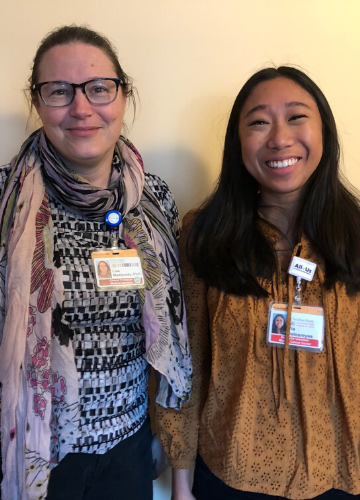School of Communication Examines How We Communicate About Genetic Health Risks

In recent years, our culture has become increasingly fascinated with genetics. Tests like wildly popular 23andMe allow you to take a DNA test from your own home that will analyze your ancestry and potential health risks indicated by your genes. In the same vein, the medical field has put a lot more emphasis on researching the genetic causes of disease.
However, very little research has been done on how patients communicate with their families about the results of genetic testing.
San Diego State University’s School of Communication has partnered with the Utah Center for Excellence in Ethical, Legal and Social Implications Research (UCEER) to study how cancer patients communicate with their families and friends about the results of genetic tests, regardless of whether or not their cancer is found to have a genetic cause. The study aims to “map the genetics communication circuit” by examining the communication that occurs between patients and their genetic counselors, families, and support networks.
“There are so many things we don’t know about how people talk about genetics,” said Dr. Heather Canary, Director of SDSU’s School of Communication. “What are they doing as they’re searching online? Who are they talking to in their family and friend networks? What are they relying on to gather and share info?”
Patient-provider communication, family communication surrounding health, and information networks have traditionally been viewed as three separate areas of study within health communication research. This project brings together experts with a wide array of expertise spanning all three domains to look at the genetics communication circuit from all angles.
Once patients agree to take part in the study, researchers examine recordings of conversations that they have with genetic counselors and their families, as well as surveying them about their social networks and their use of the internet as an informational resource and support system. This allows researchers to see where patients get their information and how they choose to discuss such a somber topic with their families and others.
The study is currently enrolling participants at Moores Cancer Center at the University of California, San Diego, and Huntsman Cancer Institute at the University of Utah. After analyzing the results of this pilot study, the researchers hope to expand the study to include cancer institutes in other regions of the U.S. so that they can see if there are cultural or geographical differences in genetics communication when people have cancer.
“By understanding how things flow through the genetics communications circuit, we can identify ways to intervene to improve that communication and understanding so individuals know actions to take for their well-being, their family’s well-being, and future well-being of relatives,” Dr. Canary said.
The content within this article has been edited by Lizbeth Persons.

